About
AIM OF NCC
The ‘Aims’ of the NCC laid out in 1988 have stood the test of time and continue to meet the requirements expected of it in the current
socio–economic scenario of the country.
The NCC aims at developing character, comradeship, discipline, a secular outlook, the spirit of adventure and ideals of selfless service amongst young citizens.
Further, it aims at creating a pool of organized, trained and motivated youth with leadership qualities in all walks of life, who will serve the Nation regardless of which career they choose.
Needless to say, the NCC also provides an environment conducive to motivating young Indians to join the armed forces.
Our Motto
The need for having motto for the Corps was discussed in the 11th Central Advisory Committee (CAC) meeting held on
11 Aug 1978. The mottos suggested were “Duty and Discipline”; “Duty, Unity and Discipline”;
“Duty and Unity”; “Unity and Discipline”.
The final decision for selection of “Unity and Discipline” as motto for the NCC was taken in the 12th CAC meeting held on 12 Oct 1980.
Inauguration of NCC.
Pre-Independence:
In the wake of the First World War, the British suffered heavy casualties and looked forward for greater Indian participation.
Hence on the 28 Feb 1917 the Indian Defence Force Bill was promulgated and the pre of the NCC, the UNIVERSITY CORPS was born.
This was possibly the first such endeavour for organising the Indian youth and kindle among them, a spirit of hope and promise,
towards achieving future freedom for the nation. A product of the silent revolution initiated by the UNIVERSITY CORPS,
was NETAJI SUBHAS CHANDRA BOSE, who joined the UC as a cadet in 1917-18, while he was a student of the Scottish Church College.
It was this initiation in Military Training that probably helped him later to lead the Indian National Army in the National Freedom Struggle.
The cadets were trained in Marching, Musketry, route-marches and field manoeuvres. Later, Indian Territorial Bill on the 22 Sep 1920,
passed by the British Govt in India came into existence and UC was reorganized as the UNIVERSITY TRAINING CORPS (UTC), as second line force.
In 1942, the UTC was remodeled on the lines of the "Officers Corps of the UNITED KINGDOM" into the UOTC in order to provide suitable
officers for all the three services.
Post-Independence:
Immediately after India gained independence, at the stroke of midnight on 14/15 Aug 1947, India saw serious strife,
and the participation of the country. The situation continued till 1948, with Pakistan Militia declared war against Kashmir.
To tide over the situation, on the recommendation of the KUNZRU committee the National Cadet Corps was raised to meet the requirements
of a National Emergency on 16 Apr 1948, with the promulgation of "The National Cadet Corps Act 1948". Then Colonel GG Bewoor, later the
Chief of Army Staff, took over as the first Director General of NCC, with cadet strength of 45000 cadets.
The Air wing of the NCC was raised on 01 Apr 50, with a squadron each at Bombay and Calcutta, while the Naval Wing came into existence
in Jul 1952, with two part time officers and sixty cadets in Bombay (now Mumbai).
In the wake of the Chinese aggression in 1962, a national emergency was declared, and the strength of cadets in the NCC grew to 2,80,000.
After the Chinese aggression, an ordinance was passed in Jul 1963 making NCC compulsory for all college going youth, of the age group of
16-25 years. Consequent to the passage of the ordinance the enrolled strength of students as cadets with the NCC grew to almost 28 Lakhs.
Presently the NCC has 14 Lakh enrolled cadets, spread in the 17 state Directorates, with 95 Group Headquarters and seven hundred and seventy four
units.
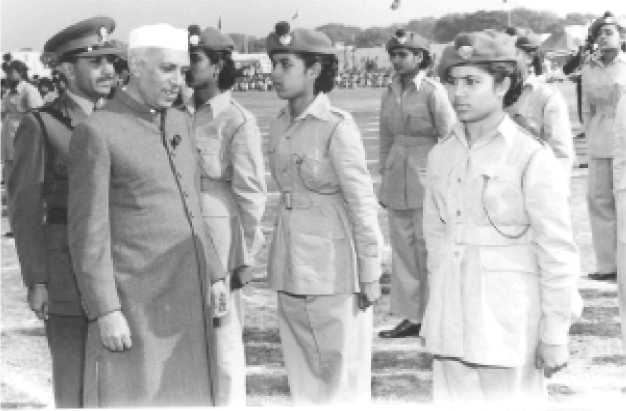
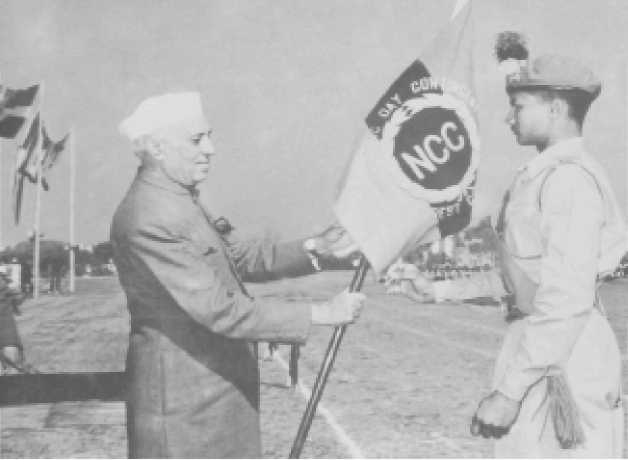
Core Values
The NCC is a responsive, learning and continuously evolving organization. Its activity is guided by certain Core Values that we endeavour to instill among all ranks of the NCC. These include the following:
- A sense of patriotic commitment to encourage cadets to contribute to national development.
- Respect for diversities in religion, language, culture, ethnicity, life style and habitat to instill a sense of National unity and social cohesion.
- Abiding commitment to learn and adhere to the norms and values enshrined in the Indian Constitution.
- Understanding the value of a just and impartial exercise of authority.
- Ability to participate in community development and other social programme.
- A healthy life style free of substance abuse and other unhealthy practices.
- Sensitivity to the needs of poor and socially disadvantaged fellow citizens.
- Inculcating habits of restraint and self-awareness.
- Understanding the values of honesty, truthfulness, self-sacrifice, perseverance and hard work.
- Respect for knowledge, wisdom and the power of ideas.
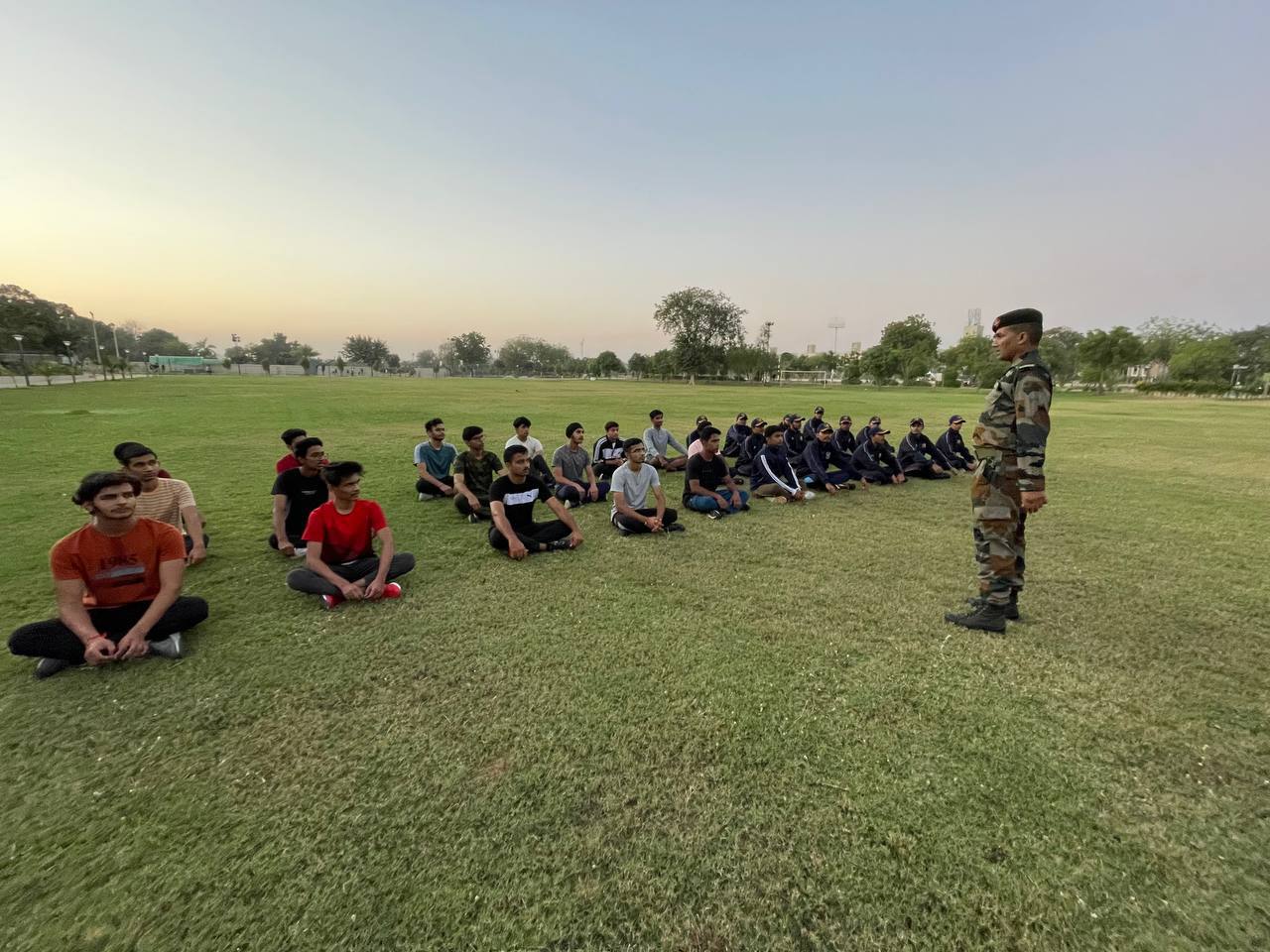
Pledge
WE THE CADETS OF THE NATIONAL CADET CORPS,
DO SOLOEMNLY PLEDGE THAT WE SHALL ALWAYS UPHOLD THE UNITY OF INDIA.
WE RESOLVE TO BE DISCIPLINED AND RESPONSIBLE CITIZEN OF OUR NATION.
WE SHALL UNDERTAKE POSITIVE COMMUNITY SERVICE IN THE SPIRIT OF SELFLESSNESS
AND CONCERN FOR OUR FELLOW BEINGS.
Flag
The NCC flag for various units of the NCC was first introduced in 1951. The flag was of same pattern, colour and size as was used by various regiments of the Army. The only difference was that it had the NCC badge and unit designation placed in the centre. Later on it was felt that the flag should be in keeping with the inter-service character of the Corps. In 1954 the existing tricolour flag was introduced. The three colours in the flag depict the three services of the Corps, red for the Army, deep blue for the Navy and light blue for the Air Force. The letters NCC and the NCC crest in gold in the middle of the flag encircled by a wreath of lotus, give the flag a colourful look and a distinct identity.
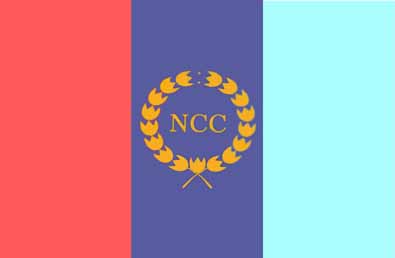
NCC Song Lyric
Hum Sab Bharatiya Hain, Hum Sab Bharatiya Hain
Apni Manzil Ek Hai,
Ha, Ha, Ha, Ek Hai,
Ho, Ho, Ho, Ek Hai.
Hum Sab Bharatiya Hain.
Kashmir Ki Dharti Rani Hai,
Sartaj Himalaya Hai,
Saadiyon Se Humne Isko Apne Khoon Se Pala Hai
Desh Ki Raksha Ki Khatir Hum Shamshir Utha Lenge,
Hum Shamshir Utha Lenge.
Bikhre Bikhre Taare Hain Hum Lekin Jhilmil Ek Hai,
Ha, Ha, Ha, Ek Hai
Hum Sab Bharatiya Hai.
Mandir Gurudwaare Bhi Hain Yahan
Aur Masjid Bhi Hai Yahan
Girija Ka Hai Ghariyaal Kahin
Mullah ki Kahin Hai Ajaan
Ek Hee Apna Ram Hain, Ek hi Allah Taala Hai,
Ek Hee Allah Taala Hain, Raang Birange Deepak Hain Hum,
lekin Jagmag Ek Hai, Ha Ha Ha Ek Hai, Ho Ho Ho Ek Hai.
Hum Sab Bharatiya Hain, Hum Sab Bharatiya Hain.
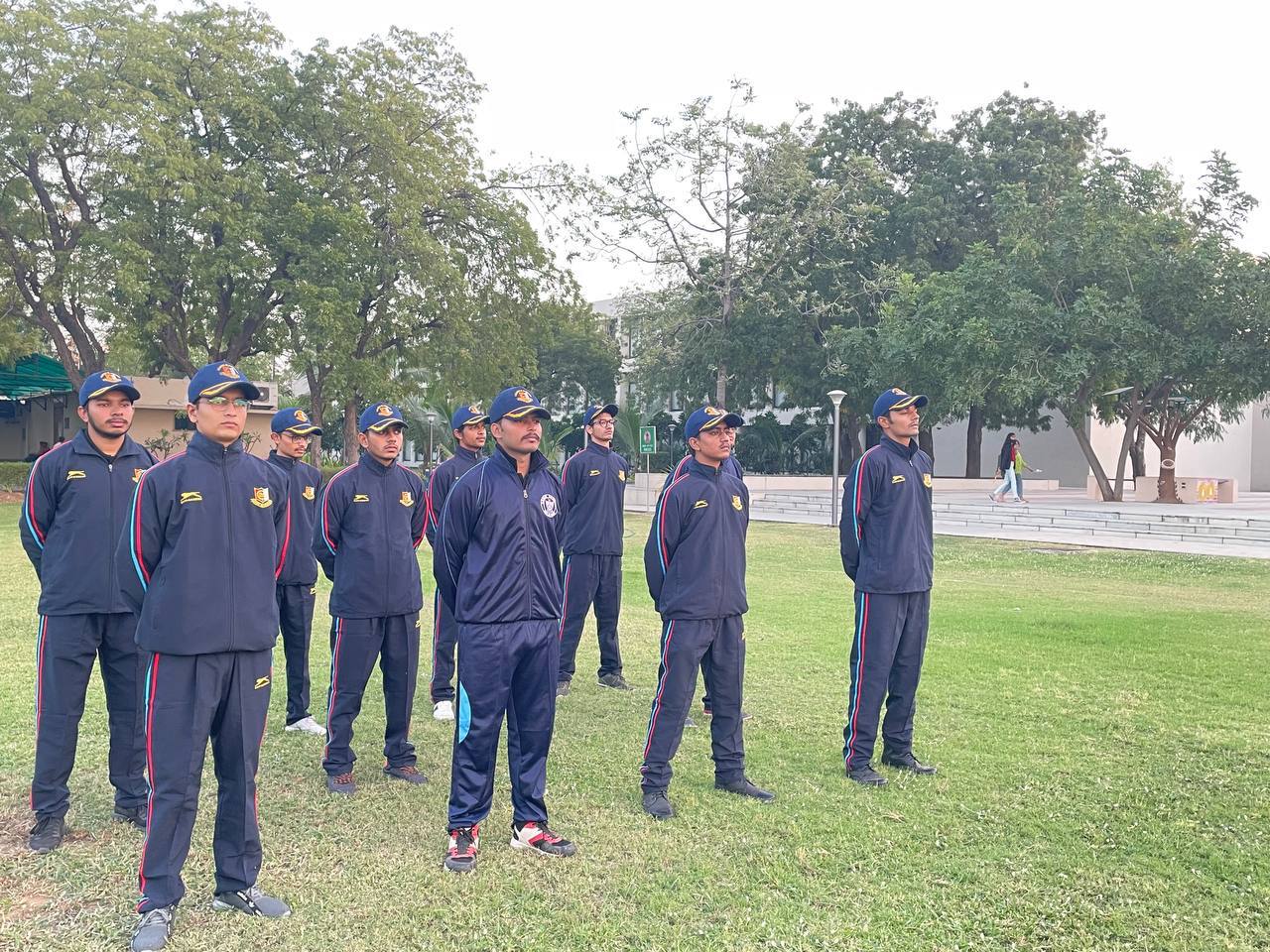
Current Size
Presently the NCC has 14 Lakh enrolled cadets, spread in the 17 state Directorates, with 95 Group Headquarters and seven hundred and seventy four units.
Benefit
What are the perks of joining Us
Second Line of Defence
NCC is a highly reputed body which is also a second line of defence. In India, many youngsters are trained in line with defence in case the need arises. If young students want to make it defense as career option, then being a NCC cadet holds a lot of weight. As they are directly associated with the ministry of defence.
Life Lessons Taught
Along with Basic Military training, valuable traits and qualities such as selflessness, honesty, discipline, hard work and ways to build confidence, gain leadership qualities and inculcation of Officer Like Qualities (OLQs) and essential life skills are also taught by means of various activities.
Travelling
Since NCC camps are held all over India therefore there is training in a various parts of the country, hence students get an opportunity of visit new places and learn the art of independence. They are required to use their social skills and their senses to get to know new places and adapt to the varying environment.
Exchange Program
Under the regime of exchange programme, there are a few selected students who get an opportunity to visit other countries and learn various things which are practised in other nations and exchange experiences with cadets who happen to come to India from foreign lands.
Extracurricular
Other than military activities, the cadets explore adventure sports and skills such as parachuting, paragliding and basic aviation courses (which are benefitial when appearing for Armed forces entrance exams).
Other Benefit
Other than just social skills they also get to learn about the history and art of the new place.
F.A.Q
Frequently Asked Questions
-
Is Army, Air Force and Navy training given to an NCC cadet, and if so with what purpose?
Yes. It exposes cadets to a regimented way of life which is essential for inculcating the values of discipline, dutifulness, punctuality, orderliness, smartness, respect for rightful authority, good and correct work ethos and self-confidence.
-
Can I get any award for some extraordinary work/performance?
Merit and extraordinary work/performance is duly recognized at every level (at the Sub-Unit/ Unit/ Group/ Directorate/ HQ DGNCC levels) and is adequately rewarded/awarded in the NCC. For details contact you’re OC/CO Unit.
-
NCC Unit at PDEU belongs to which Group/Battalion?
NCC Unit at PDEU belongs to 9th Gujarat Battalion NCC, under Ahmedabad Group of Gujarat Directorate.
-
What is a NCC Company?
The basic functional sub-unit in colleges and Plus Two institutions, having SW/SD Cadets is a Company. It is mandatory that the cadets of a particular company are from the same institution having the sub-unit.
-
What is a NCC unit and what is its composition?
The Groups are further sub-divided into Battalions, each commanded by a Lt Col or its equivalent from the other two Services, and an Officer of the rank of Lieutenant Colonel or Major as the Administrative Officer. Each Battalion also has a number of Junior Commissioned Officer’s (JCO’s) and Non-Commissioned Officer’s (NCO’s) known as “Permanent Instructors ( PI) Staff”, senior-most JCO being of the rank of Subedar Major.
-
What is the composition of Directorate General NCC?
It is headed by the Director General (DG), an Army Officer of the rank of Lieutnant General. The DG is assisted by two Additional Directors General (ADG), one a Major General from the Army and other a Rear Admiral from the Navy or an Air Vice Marshal from the Air Force. The Director General has a staff which is drawn from the three services – Army, Navy and Air Force. There are five Deputy Directors General (DD’sG) of the rank of Brigadier and equivalent, of which three are Brigadiers and one either a Commodore (Navy) or an Air Commodore (Air Force) and one a civilian officer.
Platoon
Command Structure and Ranks
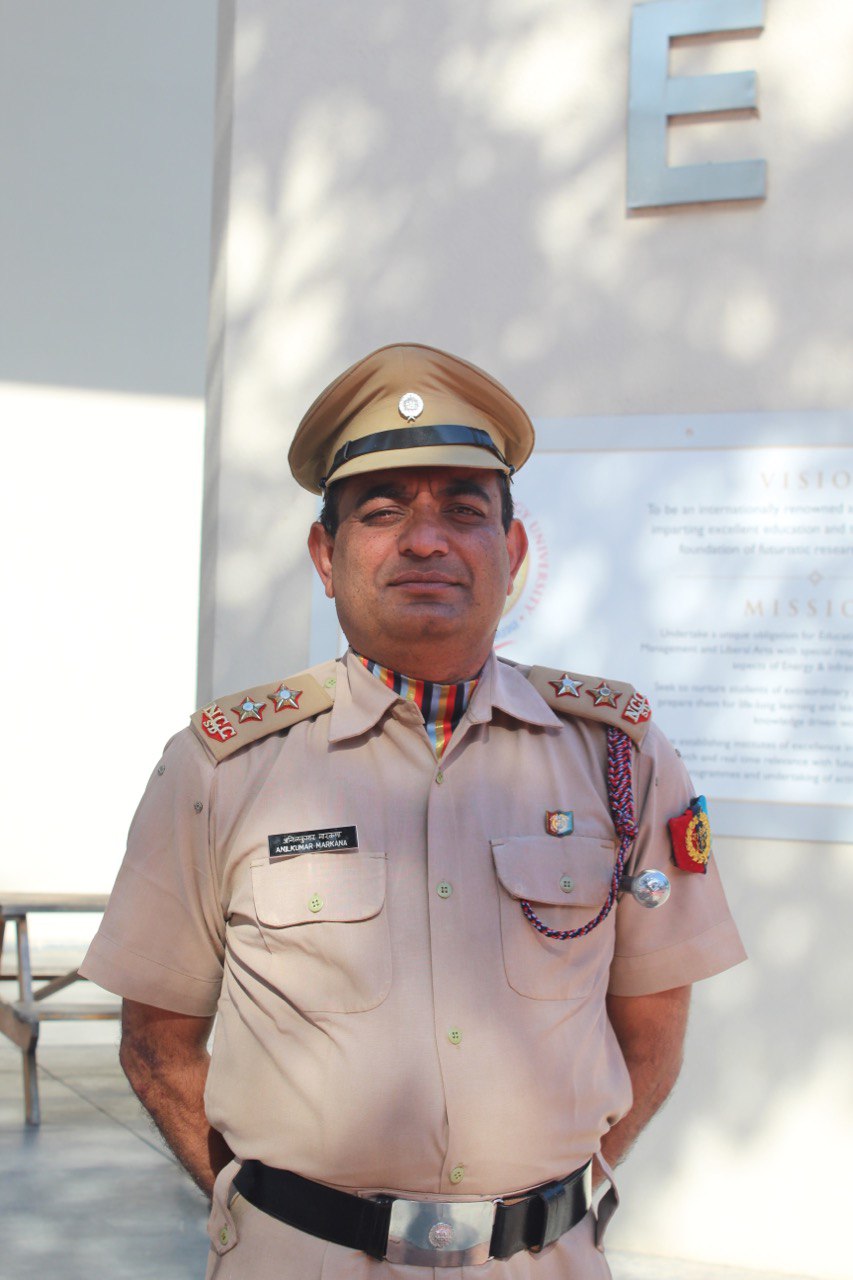
Lt. Anil Markana
Associate NCC Officer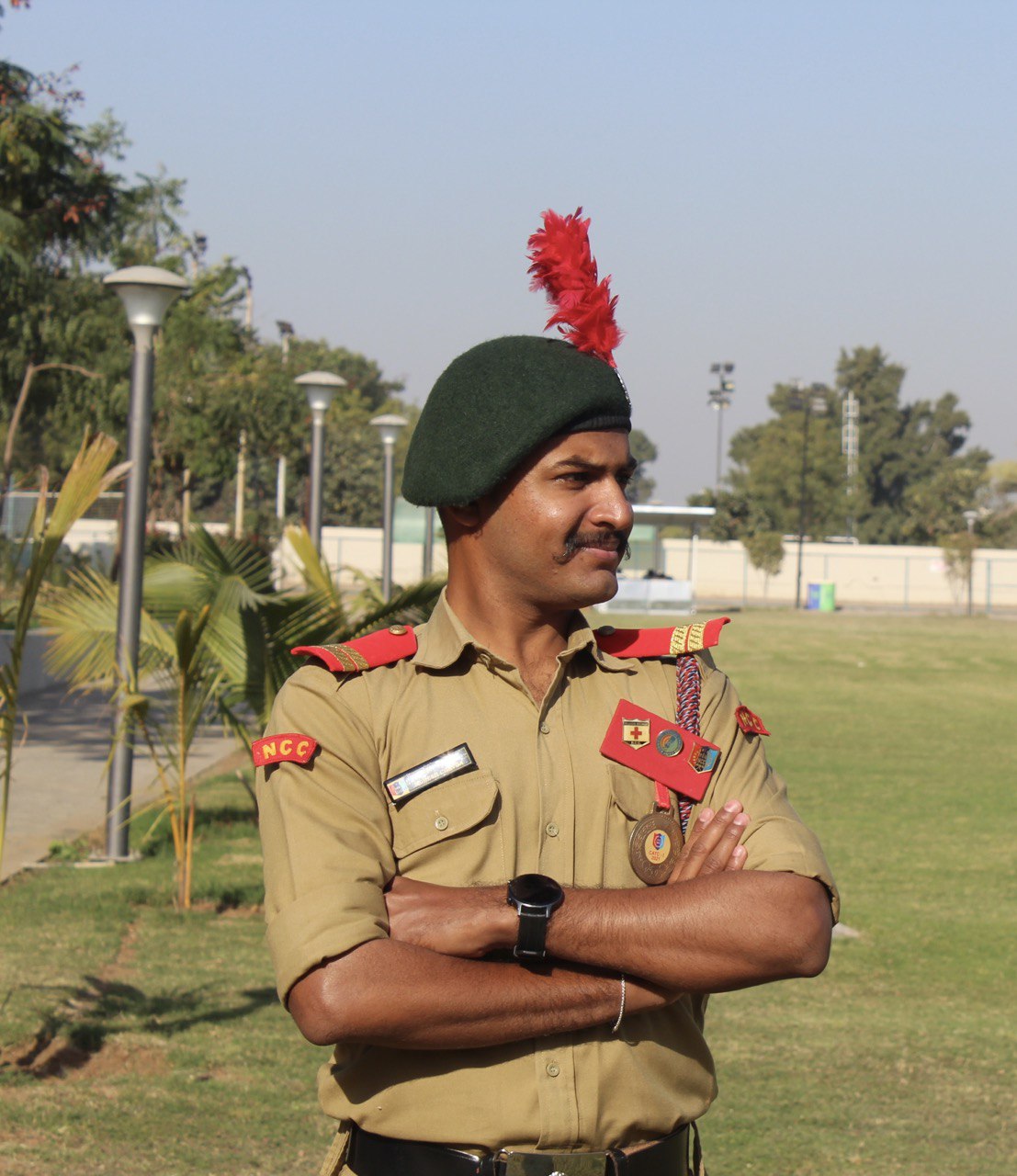
Mukesh Chavda
Cadet Senior Under Officer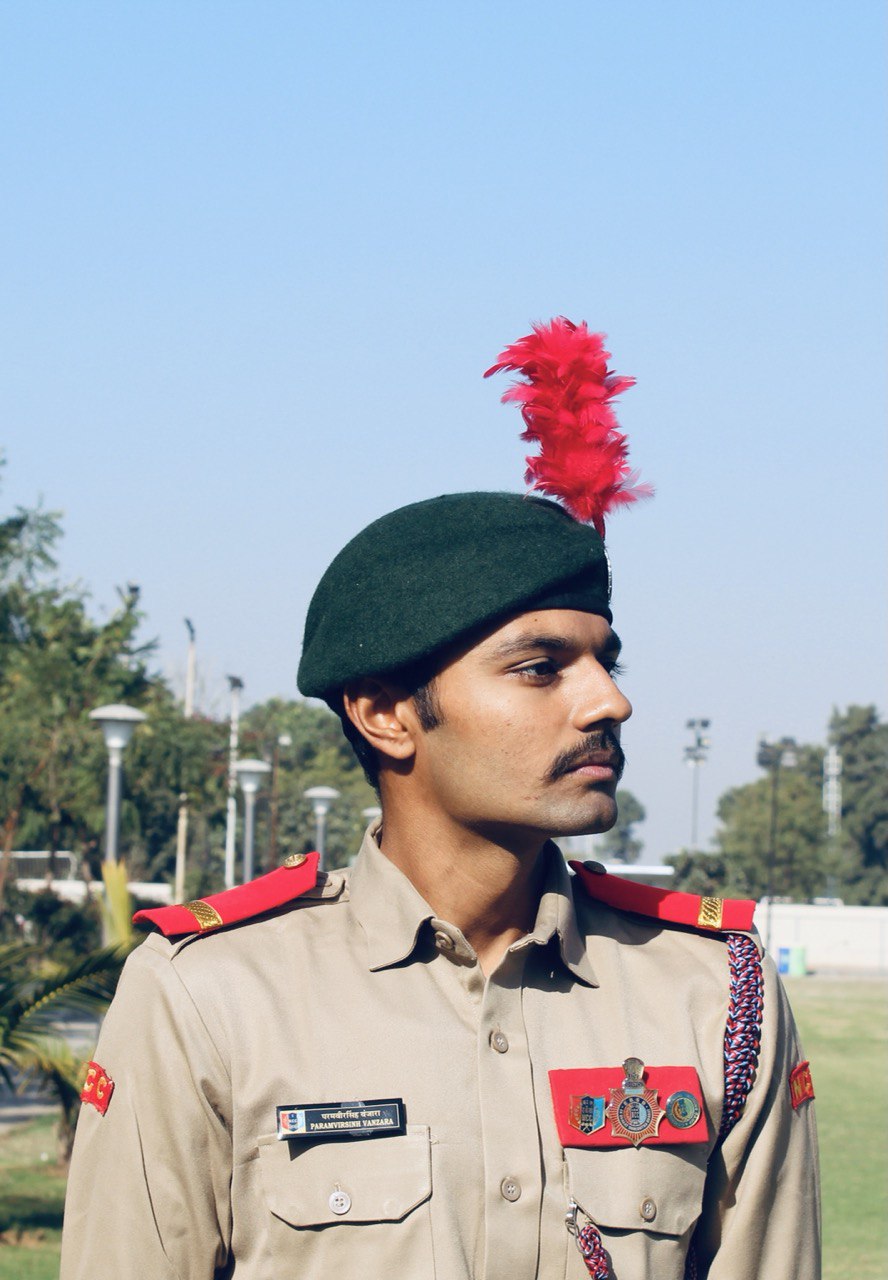
Paramvirsinh Vanzara
Cadet Under OfficerContact
Contact Us
Location:
Pandit Deendayal Energy University- PDEU (Formerly PDPU), Knowledge Corridor, Raisan Village, PDPU Rd, Gandhinagar, Gujarat 382007
Email:
nccpdeu@gmail.com
Instagram:
@ncc_pdeu



